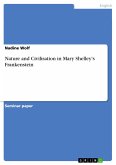Studienarbeit aus dem Jahr 2009 im Fachbereich Didaktik - Englisch - Literatur, Werke, Note: 2,3, Universität Potsdam (Anglistik/Amerikanistik), Sprache: Deutsch, Abstract: The paper will examine Mary Shelley's "Frankenstein; or the modern Prometheus" under the perspective of the Freudian psychoanalysis. Firstly, Sigmund Freud's psychic apparatus, the defense mechanisms, the drive theory and the topographical model will be explained. Secondly, the text will be analyzed in detail by taking the former mentioned parts into consideration. The aim is to give an outline of one idea how the novel can be interpreted by analyzing the meaning of the text. According to Sigmund Freud the personality of each individual consists of three parts called the Id, Super-ego and Ego. The term Id stands for drives, needs and emotions, which are supposed to be fulfilled by the pleasure principle. This means that it longs for the immediate satisfaction of its desires. The Super-ego is understood as the counterpart of the Id and contrasts ideas of social norms, values, obedience, morals and the conscience, which are mainly acquired trough the education by the parents. Freud claims further that only after the development of the Super-ego humans are able to act responsibly and to control their initial drives. "The Super-ego is frequently characterized as an internalized code, or more popularly, as a kind of conscience, punishing transgressions with feeling of guilt" (Reber, "Dictionary of Psychology" 746).The Ego is presented as a linking part between the Id and the Super-ego. Therefore, it is supposed to be the instance, which corresponds to the reality principle, also referred to as the self-consciousness.
Hinweis: Dieser Artikel kann nur an eine deutsche Lieferadresse ausgeliefert werden.
Hinweis: Dieser Artikel kann nur an eine deutsche Lieferadresse ausgeliefert werden.








